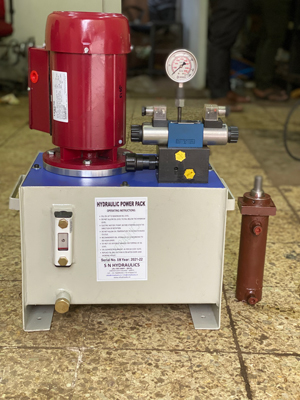A hydraulic power pack, also known as a hydraulic power unit (HPU) or hydraulic power station, is a self-contained system that generates and supplies hydraulic power to various hydraulic machinery and equipment. We S.N.HYDRAULICS manufacture and supply best quality HYDRAULIC POWER PACK
Being heart of Hydraulic Circuit we have designed our product perfectly with following features
Electric Motor or Engine:
Our Hydraulic power packs are powered by an electric motor or an internal combustion engine. The choice depends on the application, available power source, and mobility requirements.
Reservoir (Oil Tank)
The reservoir stores hydraulic fluid (usually hydraulic oil) and helps dissipate heat generated during operation. It also allows air to escape and prevents cavitation.
Hydraulic Fluid:
Hydraulic fluid is a critical component here that transfers energy within the hydraulic system. It lubricates components, provides cooling, and ensures efficient power transmission.
Filter:
Filters are used to remove contaminants from the hydraulic fluid, preventing damage to components and ensuring the system operates smoothly.
Accumulator:
An accumulator stores hydraulic energy, helping to smooth out fluctuations in pressure and absorb shocks. It can also provide additional power during peak demand.
Manifold:
The manifold is a block with channels and ports that distribute hydraulic fluid to various components. It helps organize and control the flow within the system. S.N.HYDRAULICS manufacture and supply Hydraulic power packs which find applications in various industries, including manufacturing, construction, mining, and mobile equipment. They provide a compact and efficient means of delivering controlled hydraulic power to operate different types of machinery and tools.
Hydraulic Power Pack
- CALL US+91 88288 38311 | 97680 65722
- SEND ENQUIRYresponse@snhydraulics.co.in


